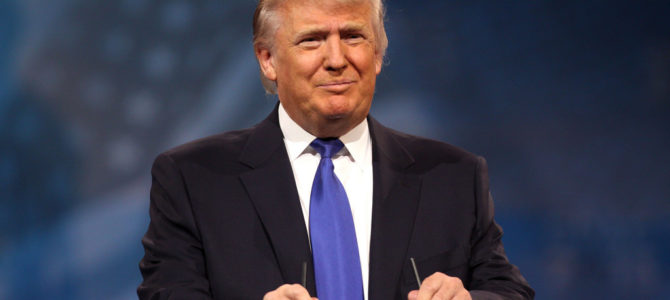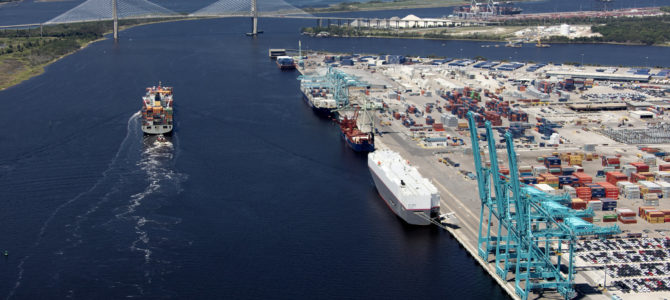
President Trump started his trade war by withdrawing America from several different sets of international negotiations aimed at reducing trade barriers on both sides. Now, he has achieved a great triumph in his meeting with the president of the European Union: he’s gotten us back into international negotiations aimed at reducing trade barriers on both sides. So, wait, what was the point again?
It’s probably a good thing that we’re getting back into free trade negotiations, because during Trump’s trade war, those negotiations have kept going without us, as seen in the European Union’s new trade deal with Japan.
So why was the US missing from the table? First, because we abandoned the Trans-Pacific Partnership (TPP), which included Japan and a dozen other countries from around the Pacific Rim, covering over 40 percent of the global economy.
The EU-Japan deal sends a message that while the US is pulling back from the global economy, other countries are not afraid to step forward. The agreement removes tariffs from imports and exports such as wines, cheeses, cars, and electronics. As Japan’s markets open, EU companies will save a little more than $1 billion a year. EU manufacturers and farmers will receive a massive tax cut—not to mention better access to the Japanese market than their US counterparts enjoy.
But not to worry. Trump has a solution for farmers cut off from the Asian market: billions in federal subsidies. That’s a good old Democratic Party policy if ever I saw one: wreck the market for farmers, then rescue them with handouts.
But we’re going to bring back manufacturing jobs, right? Isn’t that the whole point—and Trump’s big appeal to the blue-collar white voters who elected him and among whom he is still popular? How is that working out? Tell me what you notice about this report.
You might think that managers and workers at Banner Metals would be up in arms over the Trump administration’s trade policies. After all, tariffs on imported steel and aluminum have pushed raw-material prices up and margins down, forcing the company to delay plans to purchase a new $1 million cutting machine and hire two new employees to operate it….
Casey Jackson, a maintenance technician, said he would support the tariffs even if they cost him personally. ‘If it comes out of my paycheck, so be it,’ he said. ‘You got to look at the big picture. That tiny bit of sacrifice we make will create jobs.’
So let me see if I get that “big picture”: we’re going to revive manufacturing employment, one canceled expansion and pay cut at a time. This is just a microcosm of how Trump’s tariffs are actually affecting manufacturing. It turns out that many fewer Americans have jobs making steel and aluminum than are employed using steel and aluminum as raw materials. So the people being hurt by Trump’s tariffs are exactly the kind of employees his trade war is supposed to be helping.
That brings us to the big triumph of the trade war: President Trump’s meeting with European Union President Jean-Claude Juncker, in which they agreed to back off and begin reducing tariffs between the United States and Europe. Note that Juncker sold this to Trump with the craziest pitch I’ve ever heard. Here is how Juncker described the prospect of retaliatory EU tariffs against the US: “‘If you want to be stupid,’ he told Mr. Trump, ‘I can be stupid, as well.'”
This is a real thing said by one major world leader to another. It is also the best description I have ever heard of a trade war. It’s a contest between two parties over which one can throttle its economy the most. I suspect this fact is not lost on Juncker, which is why he came here to stop it from happening. I suppose he also knew that the best way to do it was to appeal to President Trump’s vanity—to be seen as coming to him, hat in hand, and to play to his self-image as a master deal-maker.
So what does America get out of this deal? Well, we don’t know yet, because there is not really a deal yet. It’s one of those great diplomatic favorites, an agreement to reach an agreement.
[T]he trade agreement between Trump and Juncker reached Wednesday was noticeably short of specifics. It was, more or less, an agreement to try to agree.
Yes, the EU will start buying US soybeans—which helps, to some degree, lessen the pressure from new China tariffs. Europe will start examining the purchase of US liquefied natural gas, and it also is proposing to consider dropping to zero the tariff rate on non-automotive industrials. But that tentative pact has real-world consequences: In return for agreeing to talk more regularly, the two sides will dismantle steel and aluminum tariffs as well as not impose any new ones. That’s a big development given that Trump has threatened jacking up tariffs on European auto imports.
So Trump started this trade war by dropping out of free trade talks that were working toward a mutual lowering of tariffs. His big accomplishment so far is to get us back into free trade talks that are working toward a mutual lowering of tariffs. So what did this all accomplish?
Maybe the point is in the fact that Trump likes Europe better. After all, the main targets of his anti-trade rhetoric are Mexico and China (along with his personal spat with Canadian Prime Minister Justin Trudeau). Or maybe the key can be found in a pre-election analysis of Trump’s own finances.
The best estimates of Trump’s fortune indicate that he would be wealthier today if he had given up on the furious deal-making that is his claim to fame and instead invested the fortune he inherited from his father in an index fund that tracks the overall performance of the market. It’s a common error. Many people would be better off not actively managing their own money and letting it lie in passive index. But they can’t resist the illusion that they are going to be the smart money that makes amazing trades and outperforms everyone else.
Maybe that’s what Trump’s trade war is really all about. Start with a series of negotiations for free-trade agreements with other countries. Withdraw from all of them and threaten a trade war. Then personally negotiate a resumption of exactly the same kind of trade talks, trumpeting any results as the product of his own unique talents.
Will the country actually be better off at the end? Who knows, but Trump will have satisfied his compulsion to be the dealmaker at the center of everything, and that’s what is really important.
Robert Tracinski is a senior writer for The Federalist. His work can also be found at The Tracinski Letter.









